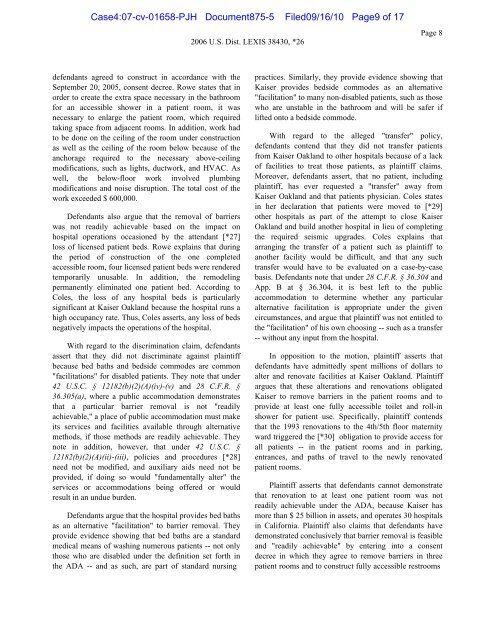exhibit 2 - SAP Lawsuit Portal
exhibit 2 - SAP Lawsuit Portal
exhibit 2 - SAP Lawsuit Portal
Create successful ePaper yourself
Turn your PDF publications into a flip-book with our unique Google optimized e-Paper software.
Case4:07-cv-01658-PJH Document875-5 Filed09/16/10 Page9 of 17<br />
defendants agreed to construct in accordance with the<br />
September 20, 2005, consent decree. Rowe states that in<br />
order to create the extra space necessary in the bathroom<br />
for an accessible shower in a patient room, it was<br />
necessary to enlarge the patient room, which required<br />
taking space from adjacent rooms. In addition, work had<br />
to be done on the ceiling of the room under construction<br />
as well as the ceiling of the room below because of the<br />
anchorage required to the necessary above-ceiling<br />
modifications, such as lights, ductwork, and HVAC. As<br />
well, the below-floor work involved plumbing<br />
modifications and noise disruption. The total cost of the<br />
work exceeded $ 600,000.<br />
Defendants also argue that the removal of barriers<br />
was not readily achievable based on the impact on<br />
hospital operations occasioned by the attendant [*27]<br />
loss of licensed patient beds. Rowe explains that during<br />
the period of construction of the one completed<br />
accessible room, four licensed patient beds were rendered<br />
temporarily unusable. In addition, the remodeling<br />
permanently eliminated one patient bed. According to<br />
Coles, the loss of any hospital beds is particularly<br />
significant at Kaiser Oakland because the hospital runs a<br />
high occupancy rate. Thus, Coles asserts, any loss of beds<br />
negatively impacts the operations of the hospital.<br />
With regard to the discrimination claim, defendants<br />
assert that they did not discriminate against plaintiff<br />
because bed baths and bedside commodes are common<br />
"facilitations" for disabled patients. They note that under<br />
42 U.S.C. § 12182(b)(2)(A)(iv)-(v) and 28 C.F.R. §<br />
36.305(a), where a public accommodation demonstrates<br />
that a particular barrier removal is not "readily<br />
achievable," a place of public accommodation must make<br />
its services and facilities available through alternative<br />
methods, if those methods are readily achievable. They<br />
note in addition, however, that under 42 U.S.C. §<br />
12182(b)(2)(A)(ii)-(iii), policies and procedures [*28]<br />
need not be modified, and auxiliary aids need not be<br />
provided, if doing so would "fundamentally alter" the<br />
services or accommodations being offered or would<br />
result in an undue burden.<br />
Defendants argue that the hospital provides bed baths<br />
as an alternative "facilitation" to barrier removal. They<br />
provide evidence showing that bed baths are a standard<br />
medical means of washing numerous patients -- not only<br />
those who are disabled under the definition set forth in<br />
the ADA -- and as such, are part of standard nursing<br />
2006 U.S. Dist. LEXIS 38430, *26<br />
Page 8<br />
practices. Similarly, they provide evidence showing that<br />
Kaiser provides bedside commodes as an alternative<br />
"facilitation" to many non-disabled patients, such as those<br />
who are unstable in the bathroom and will be safer if<br />
lifted onto a bedside commode.<br />
With regard to the alleged "transfer" policy,<br />
defendants contend that they did not transfer patients<br />
from Kaiser Oakland to other hospitals because of a lack<br />
of facilities to treat those patients, as plaintiff claims.<br />
Moreover, defendants assert, that no patient, including<br />
plaintiff, has ever requested a "transfer" away from<br />
Kaiser Oakland and that patients physician. Coles states<br />
in her declaration that patients were moved to [*29]<br />
other hospitals as part of the attempt to close Kaiser<br />
Oakland and build another hospital in lieu of completing<br />
the required seismic upgrades. Coles explains that<br />
arranging the transfer of a patient such as plaintiff to<br />
another facility would be difficult, and that any such<br />
transfer would have to be evaluated on a case-by-case<br />
basis. Defendants note that under 28 C.F.R. § 36.304 and<br />
App. B at § 36.304, it is best left to the public<br />
accommodation to determine whether any particular<br />
alternative facilitation is appropriate under the given<br />
circumstances, and argue that plaintiff was not entitled to<br />
the "facilitation" of his own choosing -- such as a transfer<br />
-- without any input from the hospital.<br />
In opposition to the motion, plaintiff asserts that<br />
defendants have admittedly spent millions of dollars to<br />
alter and renovate facilities at Kaiser Oakland. Plaintiff<br />
argues that these alterations and renovations obligated<br />
Kaiser to remove barriers in the patient rooms and to<br />
provide at least one fully accessible toilet and roll-in<br />
shower for patient use. Specifically, plaintiff contends<br />
that the 1993 renovations to the 4th/5th floor maternity<br />
ward triggered the [*30] obligation to provide access for<br />
all patients -- in the patient rooms and in parking,<br />
entrances, and paths of travel to the newly renovated<br />
patient rooms.<br />
Plaintiff asserts that defendants cannot demonstrate<br />
that renovation to at least one patient room was not<br />
readily achievable under the ADA, because Kaiser has<br />
more than $ 25 billion in assets, and operates 30 hospitals<br />
in California. Plaintiff also claims that defendants have<br />
demonstrated conclusively that barrier removal is feasible<br />
and "readily achievable" by entering into a consent<br />
decree in which they agree to remove barriers in three<br />
patient rooms and to construct fully accessible restrooms


